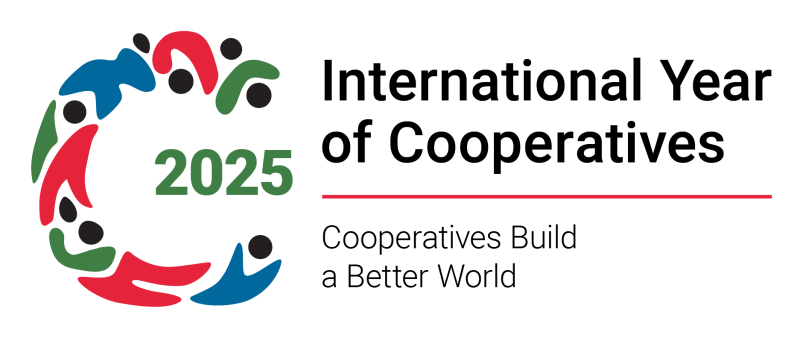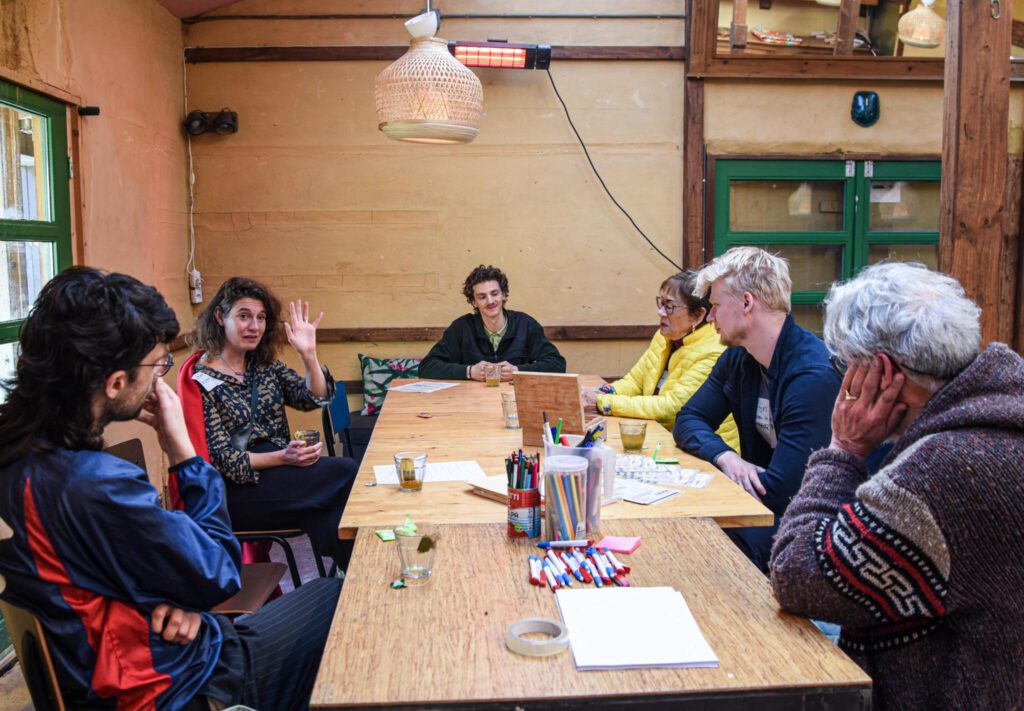This year marks the International Year of Cooperatives. We as Commons Network see the importance of highlighting cooperatives and their crucial contributions towards a community economy.
Next to our work on such alternatives, we put special attention to cooperatives in light of this special year. By telling the stories that often go untold – the stories of care, community, and collective agency – we stress the importance of cooperatives. Hence, over the next few weeks, we will explore how cooperatives in Amsterdam and around the world are rebuilding from the bottom up.
In this blog post series, Tabea Dick sheds light on the vital role of cooperatives. Tabea is interested in the cooperative movement; specifically, she studies the internal gendered power relations within energy and housing cooperatives in Amsterdam. In this blog series titled ‘Cooperatives in the Spotlight’, she explores the importance of cooperatives, exhibits well-established cooperatives around the world, and presents her own research findings. In this first blog, she introduces us to the International Year of Cooperatives and the vital role of community organising.

In a time when communities are searching for more just, sustainable, and democratic ways of organising economies, co-ops are presenting a promising alternative to extractivist, unjust capitalist economic practices. Cooperatives are established in various domains – ranging from energy, housing and food cooperatives to neighborhood and platform cooperatives. While co-ops are not a newly emerging phenomenon, they are increasingly gaining importance and popularity.
The International Cooperative Day is not simply an opportunity to put co-ops into the spotlight. It is also a crucial moment to reflect on their impact and potential. This year, the International Cooperative Day is part of an even broader celebration: the International Year of Cooperatives (IYC), designated by the United Nations. The theme of this year’s celebration – “Cooperatives Build a Better World” – could hardly be more relevant. Citizens around the world are convinced that co-ops play a vital role in tackling the interconnected crises of our time – from economic inequality and social fragmentation to climate change.
By highlighting cooperatives and the global cooperative movement, the International Year of Cooperatives offers two major opportunities:
→ Recognise the real contributions of co-ops – in creating decent work, democratising the economy, and sustaining communities.
→ Reimagine how we might design our systems differently, drawing on cooperative values such as mutual aid, democratic governance, and long-term thinking.

Despite their deep roots and impressive reach, cooperatives are often overlooked in mainstream discussions about economic transformation. Yet, cooperatives offer a promissing alternative to dominant capitalist systems, which frequently concentrate power and prioritise profit over people. Rather than relying on hierarchy and competition, co-ops are based on democratic ownership, collective decision-making, and care for the community. Due to a lack of attention given to cooperatives, in many countries, co-ops quietly operate in sectors ranging from agriculture (e.g., Vokomokum) and housing (e.g., de Nieuwe Meent) to energy (e.g., Zuiderlicht), healthcare (e.g., Welcoop), and tech (e.g., CoopTech Hubs. But we believe that it is time to bring them out of the margins and into the spotlight. Co-ops show us that another economy is not only possible – it’s already happening. However, to grow and thrive, these models and powerful initiatives need recognition, support, and visibility. It’s time to bring them out of the margins and into the spotlight.
Why Visibility Matters
Despite their deep roots and impressive reach, cooperatives are often overlooked in mainstream discussions about economic transformation. Yet, cooperatives offer a promissing alternative to dominant capitalist systems, which frequently concentrate power and prioritise profit over people. Rather than relying on hierarchy and competition, co-ops are based on democratic ownership, collective decision-making, and care for the community. Due to a lack of attention given to cooperatives, in many countries, co-ops quietly operate in sectors ranging from agriculture (e.g., Vokomokum) and housing (e.g., de Nieuwe Meent) to energy (e.g., Zuiderlicht), healthcare (e.g., Welcoop), and tech (e.g., CoopTech Hubs. But we believe that it is time to bring them out of the margins and into the spotlight. Co-ops show us that another economy is not only possible – it’s already happening. However, to grow and thrive, these models and powerful initiatives need recognition, support, and visibility. It’s time to bring them out of the margins and into the spotlight.
Commons Network and the Role of Narratives
At Commons Network, we believe in and work on a transformation of the current economic system: one that moves from destructive and harming practices towards caring and democratic societies. Our projects on Community Wealth Building (CWB), the community and caring economy highlight the importance of communities in establishing the foundations for more just and resilient alternatives. Such alternatives are vital for shared and democratic forms of value creation and distribution – and thus, for the wellbeing of societies. Through our work, we show how community-led initiatives in the Netherlands – including cooperatives – can reclaim local economies and redistribute power. These are not simply abstract ideas; they are concrete practices rooted in solidarity, reciprocity, and collective care. Over the next few weeks, we will explore how cooperatives in Amsterdam and around the world are rebuilding from the bottom up.
Here an overview of what you can expect regarding our contributions to the International Year of Cooperatives 2025:
1. In our next blog, we will look at inspiring cooperative stories around the world.
2. In our last blog of this series, Tabea will present her research findings on internal gendered power relations within housing and energy cooperatives in Amsterdam.
 ☰
☰